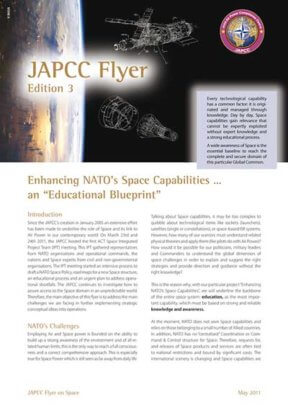Introduction
Since the JAPCC’s creation in January 2005 an extensive effort has been made to underline the role of Space and its link to Air Power in our contemporary world. On March 23rd and 24th 2011, the JAPCC hosted the first ACT Space Integrated Project Team (IPT) meeting. This IPT gathered representatives from NATO organisations and operational commands, the nations and Space experts from civil and non-governmental organisations. The IPT meeting started an intensive process to draft a NATO Space Policy, road maps for a new Space structure, an educational process and an urgent plan to address operational shortfalls. The JAPCC continues to investigate how to assure access to the Space domain in an unpredictable world. Therefore, the main objective of this flyer is to address the main challenges we are facing in further implementing strategic conceptual ideas into operations.
NATO’s Challenges
Employing Air and Space power is founded on the ability to build up a strong awareness of the environment and of all related human limits; this is the only way to reach a full consciousness and a correct comprehensive approach. This is especially true for Space Power which is still seen as far away from daily life.
Talking about Space capabilities, it may be too complex to quibble about technological items like rockets (launchers), satellites (single or constellations), or space-based ISR systems. However, how many of our warriors must understand related physical theories and apply them (like pilots do with Air Power)? How would it be possible for our politicians, military leaders and Commanders to understand the global dimension of space challenges in order to explain and suggest the right strategies and provide direction and guidance without the right knowledge?
This is the reason why, with our particular project “Enhancing NATO’s Space Capabilities”, we will underline the backbone of the entire space system: education, as the most important capability, which must be based on strong and reliable knowledge and awareness.
At the moment, NATO does not own Space capabilities and relies on those belonging to a small number of Allied countries. In addition, NATO has no “centralised” Coordination or Command & Control structure for Space. Therefore, requests for, and releases of Space products and services are often tied to national restrictions and bound by significant costs. The international scenery is changing and Space capabilities are popping up everywhere. Yet, notwithstanding some international treaties, there is no common understanding to assure a peaceful use and balanced management of all capabilities. If NATO wants to contribute to an equilibrium within the entire Alliance and other international stakeholders, it needs to strengthen its capability to manage the Space domain. This process starts by establishing an internal tailored organisation and educating and training specific experts. The best example comes from the United States with its unique organisation and space community. As some Allied countries like the UK, France, Germany and Italy have done, all Nations should create internal structures, departments and facilities in order to develop expertise and, if “numbers” allow, establish a specific space military career. This is the only way to achieve those robust and common capabilities which are a prerequisite to face new conflicts and other arising emergencies. Today, we do not share space information well, the few NATO space posts are filled only with US experts and we do not exploit the power that this Alliance should have and could express. One of the outcomes of the Lisbon Summit underlines the need to keep this alliance as “The Alliance”, strong, tied and coordinated. NATO history demonstrates that this is possible and it remains mandatory. Ballistic Missile Defense has become a reality for NATO and the whole space environment has started to be our new “battlefield”. This is why we need Space Expertise and Space Culture, at all levels, in order to understand and protect this essential Global Common. So far, the NATO Command and Control structure with its rules, its common situational awareness picture and its common standardisation process of military requirements (both technological, educational and training) has been the best way to keep all Allied countries collectively efficient and cohesive. Will NATO use the same approach to employ the Space domain?
JAPCC Role and Goals
NATO currently has a Space Course at the Oberammergau School in Germany. France developed a similar course at the CASPOA (“Centre d’Analyse et de Simulation pour la Préparation aux Oprérations Aériennes”) in Lyon. In addition, some national training capacities are evolving to counter the lack of education and training. However, for example, we do not have a space imagery course or a space weather course. And we are missing courses dealing with the topic of “A Day Without Space”. The strong link with the EU, the linked European civil space organisation and the growing outreach of the U.S. to other nations are gaining momentum and these opportunities could be the catalyst to build the right educational process. Sharing and cooperation are the key elements. Through our JAPCC project, we will try to develop a Blueprint which could be the baseline for all Allied countries. It will include an educational program and recommendations in order to create new education and training products. These products could then be offered by single Nations or inside the NATO environment.
Conclusion
NATO could be a strong binder in the field of space. Contemporary operations demonstrate that common needs, understanding and political will, often let us reach any goal and let us face the majority of global challenges and threats (like terrorism & piracy).
It will be necessary to make many efforts including economic investments. We need to press on to establish, as soon as possible, the right culture, knowledge and governance with an adequate policy/strategy and road map. The future of the space environment and of the world lies in international peaceful cooperation for global security and confidence.











